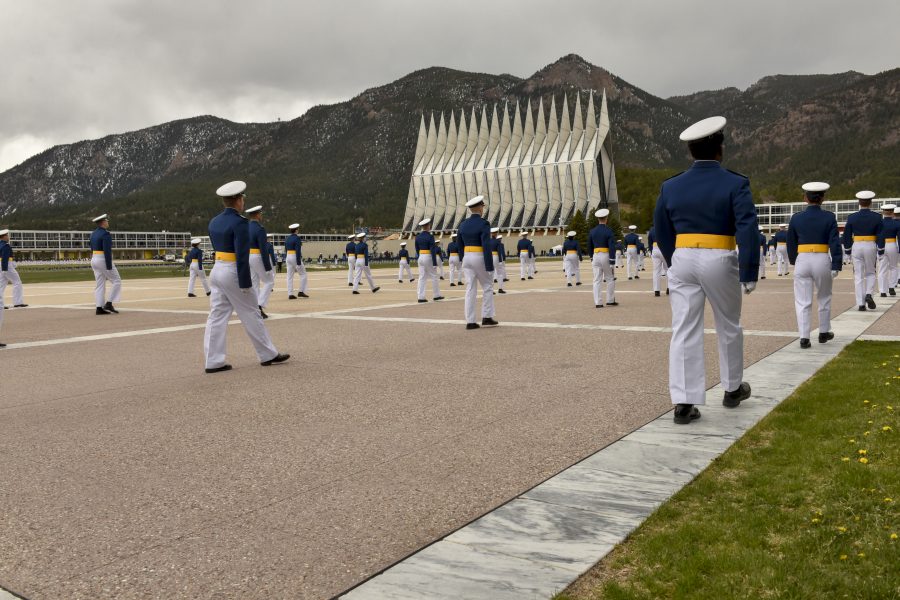The U.S. Air Force Academy has kicked out students and reprimanded others after nearly 250 cadets were suspected of using online learning to cheat on tests and plagiarize assignments last spring.
USAFA sent freshmen, sophomores, and juniors home from the Colorado Springs, Colo., campus in March 2020 as the new coronavirus spread across the U.S. For the first time, the school of more than 4,000 students pivoted to distance learning to finish out the semester.
But that presented opportunities for students to game the system, away from the watchful eyes of professors, other cadets, and a wall bearing the school’s honor code: “We will not lie, steal, or cheat, nor tolerate among us anyone who does.”
“Infractions ranged from failing to properly cite sources, to using unauthorized online tutoring websites to receive solutions to exam questions in real time, to completing final exams in small groups,” the school said Jan. 29.
They were caught through “existing Dean of Faculty academic safeguards,” and most of the 249 students admitted to cheating, USAFA said.
One student was expelled and one resigned from the service academy because of their misconduct, spokesman Mike Slater said. Others must complete six months of probation and remediation, while some cases are still under review. The school hopes remedial measures will dissuade students from violating the rules again.
“Remediation is a consequence and not an act of leniency,” USAFA Superintendent Lt. Gen. Richard M. Clark said. “If earned, remediation provides an opportunity to reset the moral compass.”
The school waited for students—who run the process of holding fellow cadets accountable for honor code violations—to return to campus for the fall semester before taking punitive measures.
“The process is currently progressing slower than normal, primarily due to COVID restrictions, but the academy is dedicated to ensuring cadet accountability throughout the entire honor process,” the school said. “Cadets in violation of the honor code are not allowed to represent the academy until they complete the required remediation.”
The incident highlights the challenges of increasingly digital education, particularly as the pandemic has forced schools across the globe to go virtual. Though all USAFA cadets are back on campus for the 2020-2021 school year, classes are still a mix of in-person and online instruction.
USAFA isn’t the only service academy to run into misconduct issues during remote learning. Last year, 73 cadets at the U.S. Military Academy at West Point were accused of cheating during an online calculus final—the largest cheating scandal in the school’s recent history.
The Air Force Academy has dealt with its own spates of cheating in the past, including a 2019 incident when 10 cadets were suspected of cheating on final exams, and in 2014 when 40 freshmen were investigated for copying lab work for a chemistry class.
The 2014 investigation was the “fourth probe of cheating involving a group of cadets at the Air Force Academy since 2004,” according to the Associated Press.
USAFA is taking the latest cheating as an opportunity to overhaul its honor code for the first time in several years.
“The purpose of the review is to provide findings and recommendations for improvement to the Honor Program, ensuring the Cadet Honor Code and Honor Program relevantly and effectively achieve cadet character development,” the school said.
A review committee will discuss ways to better encourage “living honorably” with senior leaders, school alumni, cadets, and other stakeholders. There is no set timeline for finishing the review or implementing its findings.
Clark acknowledged the probe during a Jan. 21 AFA Mitchell Institute for Aerospace Studies event, but did not say what happened last spring to prompt a new look at the entire honor system.
“We recognize that we need to take a look at the honor code, and make sure that we’re serving these cadets well, so that they are internalizing it and understanding what it means to live honorably,” Clark said.
The point is not to threaten a cadet’s career, he said, but to put them back on the right track if they do violate the school’s trust. Still, students need to take misconduct seriously: “It could have a pretty significant impact on your career, if your career gets to continue,” he said.
“The honor code is there to develop these folks that we bring in from all different walks of society, from all different places, and develop them so that by the time they graduate, … they are committed to that honorable living, not only as graduates, but for the rest of their lives, that it is something that they actually believe in,” Clark said.
